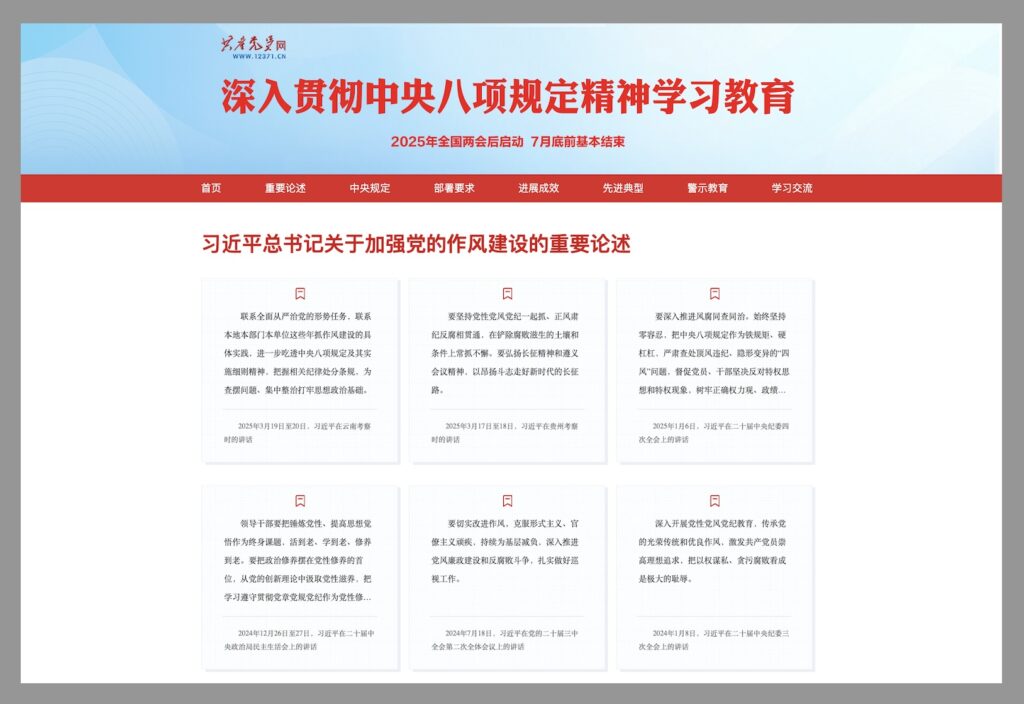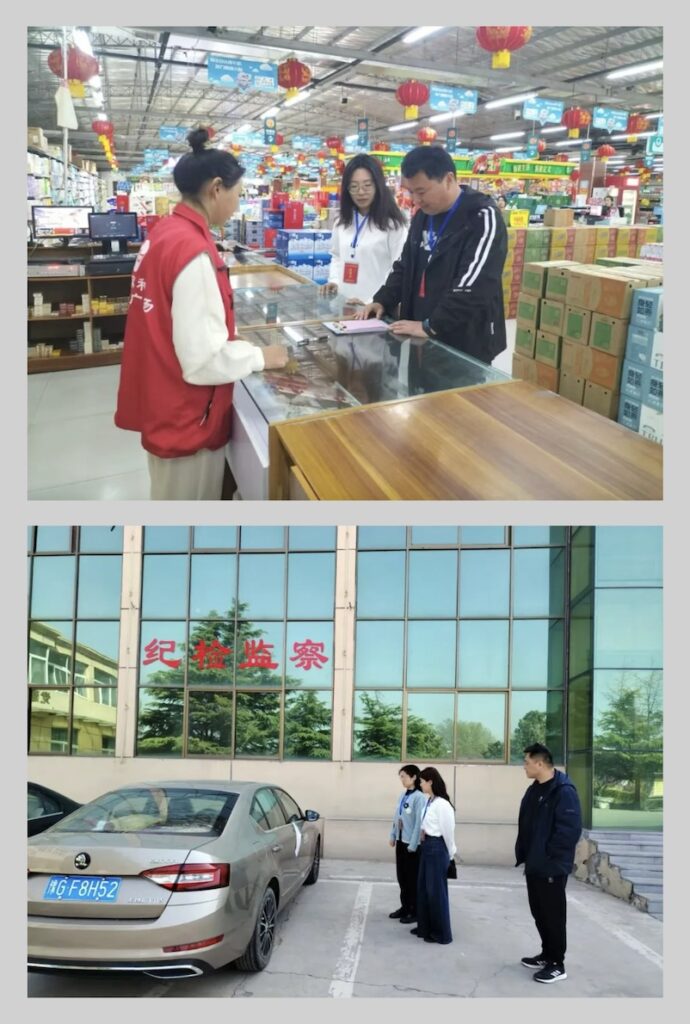
As Tomb Sweeping Day approached last month, Yang Zhengan (杨郑安), a former deputy secretary of Zhengzhou’s local People’s Congress, found himself swept into a different kind of public ritual. Local party-run media in Henan’s capital city, amid the latest wave of anti-corruption actions rolling across the country, freshly reported his expulsion from the Communist Party last year for accepting shopping cards, bath house vouchers, and expensive liquor from individuals seeking to trade on his influence.
Yang is not alone. In recent weeks, official circulars and party-controlled media have publicized similar “exemplary cases” (典型问题) of corruption nationwide. But this is not corruption reporting. Rather, it is corruption signaling — designed to project toughness on corruption, direct public indignation toward isolated bad-apple scapegoats, and crucially, demonstrate to Beijing that local officials are complying with central directives.
This all-too-familiar pattern of corruption treatment in the media in China, which deliberately ignores systemic causes, illuminates how the Chinese Communist Party (CCP) addresses — and more importantly, fails to address — a problem that remains as entrenched today as it was a decade ago.
Why is China making a fuss about corruption right now, and yet again?
Ritual Without Reform
This latest wave began last month with the nationwide launch of a new disciplinary campaign that will run through July. During provincial tours in March, Xi stressed the need to “thoroughly understand the spirit of the Central Eight Regulations” and “resolutely combat the problems of formalism and bureaucracy.” These regulations, issued shortly after Xi took power in 2012, initially targeted official extravagance, banning lavish banquets, unnecessary travel, and excessive gift-giving — like those bath vouchers for Deputy Secretary Yang. They formed the cornerstone of Xi’s broader anti-corruption push that has been periodically reinvigorated through campaigns like the current one.
Recent media and propaganda responses to the renewed Central Eight Regulations push have come in several distinctive forms.
One is exemplified by Yang Zhengan and his shopping cards, an act of signaling using previous prosecutions and punishments as examples. The examples, or “exemplary cases,” have the dual role of finger wagging and demonstrating local action. Behave, the lists say to those below. Look at us behaving, they say to those above. Yang’s case, with only the sparsest of details provided, appeared late last week in a circular (通报) from Zhengzhou’s Discipline Inspection Commission, the local anti-corruption authority under the national-level Central Discipline Inspection Commission (CCDI). Among other media, the circular was published by the Dahe Daily (大河报), a newspaper directly controlled by Henan provincial party authorities.

Also on the list of “exemplary cases” was that of Jin Yinhua (靳银华), a section-level official in Zhengzhou Economic and Technological Development Zone, an economic development area outside the provincial capital offering industrial access to central China’s transportation hub. Jin was disciplined in February this year for improperly hosting (违规操办) his son’s wedding banquet. According to the circular, he invited multiple individuals under his regulatory authority — presumably, companies located in the zone — and accepted gift money.
Finally, there was Chen Yinfu (陈垠甫), the former Party Secretary of Jiehe Village on the outskirts of Zhengzhou. He was expelled from the Party for repeatedly accepting cigarettes and alcohol as gifts from construction project managers in his village during banquets to celebrate Spring Festival and Mid-Autumn Festival between 2020 and 2023.
Behave, the lists say to those below. Look at us behaving, they say to those above.
Exemplary case lists like the one in Zhengzhou have already been posted in Guizhou province, Gansu province, and Henan province, and many more are sure to come this month. After all, the use of these exemplary case lists was prescribed by the CCDI earlier this month, when it directed inspection teams across the country to “use typical cases of violations of the Central Eight Regulations to strengthen warning education” as part of the nationwide learning campaign running through July.
A second form of media and propaganda response is “meta-propaganda,” a form of self-referential theater where performing the appearance of action becomes more important than the action itself. In a sense, the entire Central Eight Regulation push is a call for four months of corruption-related meta-propaganda. And this can readily be seen in specific examples over the past week.
The Fight for the Photo-Op
Across the country, the public accounts of discipline inspection offices on social media — most variations of the word “Clear Breeze” (清风) — have sprung into action since the anti-corruption push began. But this action is again about signaling action, not about taking action. At “Clear Breeze Xinxiang” (清风新乡), the account of a prefectural-level city in northern Henan, officials documented inspection teams conducting both open and covert monitoring during the recent Tomb Sweeping Day holiday. They claimed to have targeted the private use of government vehicles, exorbitant banquets and other infractions.
Did discipline inspectors in Xinxiang actually show their work? Certainly. But not in the way you might think. One of the local office’s most typical posts reports nothing about the specifics of related actions, only that inspectors “organized implementation of the spirit of the Central Eight Regulations.” This is an odd turn of phrase. Why, 13 years after the regulations were introduced, would their “spirit” need its implementation to be organized? The answer, of course, is that these are not rules or regulations to be systematically enforced as laws might be under a system of rule of law. These are political prescriptions pressed within the Party, which for all intents and purposes is above the law.
The root of the problem — the lack of real mechanisms governing a Party above the law — is right there, plain as day for anyone who looks past the pageantry. But this fact is a sacred chalice, a sin gilded as political virtue. No one can question or deny it, which is to say the Party’s supremacy, resulting in widespread impunity. But everyone can “implement the spirit.”

Understand that the Central Eight Regulations are political and ideological prescriptions within the Party, to be enforced as ever through campaign-style governance rather than consistent and concerted oversight, and you understand why officials at every level are scurrying off to “organize implementation” (组织开展….落实). And you understand why the meta-propaganda can quickly become ridiculous.
In the same post from the local discipline inspection office in Xinxiang, for example, officials are shown in proverbial action. One image shows a visit to the cigarette counter — to do what is unclear, but we may recall the cigarettes gifted, allegedly, to the local village official Chen Yinfu in the above mentioned case. Another image shows three officials staring at a sedan parked outside the discipline inspection office. The only explanation at all is to tell us that “the disciplinary inspection and supervision organs of Weihui City, Yanjin County, Weibin District, Hongqi District” and other counties under the city’s jurisdiction are “resonating in unison,” conducting inspections and “establishing new practices,” all to “promote the thorough implementation of the spirit of the Central Eight Regulations.”
We might laugh at the expense of these local discipline inspectors for their poorly-conceived act of political theater. But they understand, like every player in the system — the savvy and the less so — that this is how the story goes. Xi Jinping’s latest stage instructions mean that it is time to perform. It is time to “swat flies” (打苍蝇), or make an example of small-time officials while leaving the core system intact.
Changing the script on corruption would require a political shift so fundamental that it is unthinkable, upsetting the Party’s unassailable role above the law — and ultimately above accountability.
Make no mistake, this show will go on.

Dalia Parete




















